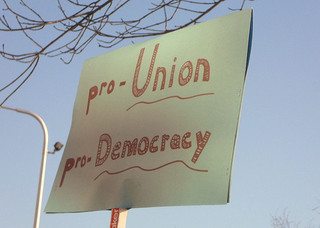‘No’ can be positive
In recent weeks the debate over Scottish independence, to be put to the vote in September, has intensified with both sides putting forward their cases much more passionately than they have so far in the campaign. However, the behaviour of the ‘no’ campaign (the pro-Union side) raises a question about referenda in general. When considering this it is useful to put our own personal thoughts about the issue to one side.
My view on Scottish independence is that despite thinking it is inevitable the nation will secede eventually, I do not think Scotland should become an independent country this year as it appears the ‘yes’ side have no idea how their new nation would actually work, despite independence being the stated aim of the SNP for more than half a century.
 How the country’s memberships of the EU, pound or euro, NATO, retention of the monarchy and much else would work is still unstated. So as a pro-Unionist, I despair at the tone being taken by the No campaign. The organisers seem determined to scare Scots into remaining in the Union. Doom-mongering predictions of Scots forced into penury in a poor, isolated country with banks 12 times its GDP, like post-crash Ireland but worse, are regularly trotted out by pro-Unionists with hardly a positive reason to
How the country’s memberships of the EU, pound or euro, NATO, retention of the monarchy and much else would work is still unstated. So as a pro-Unionist, I despair at the tone being taken by the No campaign. The organisers seem determined to scare Scots into remaining in the Union. Doom-mongering predictions of Scots forced into penury in a poor, isolated country with banks 12 times its GDP, like post-crash Ireland but worse, are regularly trotted out by pro-Unionists with hardly a positive reason to
stay in the UK in sight.
People make political decisions based on emotion as well as cold rationality
People make political decisions based on emotion as well as cold rationality, and no more so than their very national identity. What does Scotland gain from being in the UK? What is our common heritage, what are our common values? Or from the left, a progressive view: how much stronger are we together in the face of globalisation in a UK built on solidarity than an independent Scotland?
All of these options seem to have been ignored by the pro-Union side, desperate to avoid secession. This is all rather reminiscent of the referendum on changing to the Alternative Voting system (AV) for general elections in 2011. The No2AV campaign told people it would be confusing, put extremists into parliament, and erected billboards suggesting that the costs of the change would mean soldiers went without equipment and babies would be denied incubators and emergency post-natal care, none of which was true.
However the tactic worked, with voters rejecting the change 70-30 percent from 60-40 percent at the start of the campaign. Maybe the essence of being opposed to something means one cannot sound overtly positive. It is easier to articulate a vision of change than one of the status quo. But for the sake of public debate around crucial questions of solidarity and identity, rather than cynical transactional politics, it is incumbent on the ‘no’ side to try.
[divider] flikr.com/scottishgovernment
[divider] flikr.com/rochelle,justrochelle

Comments